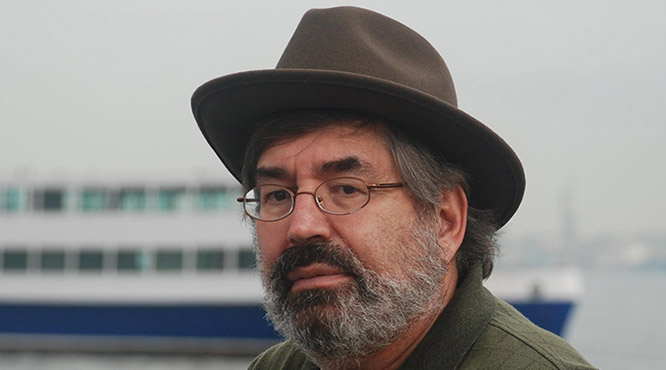In Memory of David Bensman, 1949–2020
In Memory of David Bensman, 1949–2020
We remember longtime Dissent editorial board member David Bensman.

Dissent was important to David Bensman’s life and career. “Irving Howe invited me,” he wrote, “to write for Dissent in 1972, when I was a graduate student. . . . This was one of Dissent’s first moves toward generational reconciliation, but given my membership in a family of Dissentniks, it was a tentative one. My assignment was to write about interesting articles in other magazines; my mission, which Irving never spelled out, was to find my political voice against the backdrop of New Left sentimentality and neoconservative heresy.”
He joined the editorial board two years later. He found his voice and he found his own subjects: labor movements and working people, social and economic justice, and education. He studied places and moments in time where communities, economic institutions, and public policies intersected. Take Rusted Dreams: Hard Times in a Steel Community (1987), which he wrote with Roberta Lynch. The book sets one closed steel mill in Southeastern Chicago in the context of the deindustrialization that transformed the American economy. David and Roberta wrote about the economic manipulations and cost-cutting that led to the closing of the mill and others like it (notably South Works, the largest steel mill in the country), and the economic ideas and policies that drove this transformation (which we now call neoliberalism or market fundamentalism). They described how workers struggled without the jobs that they had counted on, how their neighborhoods collapsed. The book brought together economics, sociology, and contemporary history. It is readable and still stands up.
David’s father, the sociologist Joseph Bensman, once said to me that the best work gets done by bringing different disciplines together. David worked that way. He also enjoyed working in collaboration. He and I wrote several articles together for Dissent, starting with a short note on Jimmy Carter in 1976. David took the lead. He gently educated me (the older greenhorn with a Midwest background) in Dissent’s ways and the recent history of the American labor movement. For a while we were in a study group together.
Meanwhile, he started his academic career. He taught adult education classes for AFSCME’s District Council 37. He joined the School of Management and Labor Relations at Rutgers University, and eventually became its chairperson and a professor (he had just retired at the time of his death). His students praised him for his mentoring; he helped them find their voices and places where they could use their talents. At times he joined groups that they ran: New Jersey Immigration Policy Network and Jobs with Justice were mentioned in tributes to him when he died. They expressed his need for creative, productive activism.
David’s unique way of guiding and mentoring extended to his own family. He leaves behind his soulmate, Josephine; two daughters, Jessie and Jean; two sons, José and Joseph; and two sisters, Rhea and Miriam. He affected them all but perhaps his influence is most visible in his two sons, as he helped each to find their way into adulthood. He enjoyed time with his extended family, and he learned from them—he once wrote a report that stemmed from observing one of Josephine’s sisters who was a social worker in a Bronx elementary school.
One of David’s later projects was Central Park East Elementary School and Its Graduates: Learning by Heart (2000). Deborah Meier, another member of Dissent’s editorial board and a personal friend of David’s, founded CPE in 1974. The book went well beyond personal friendship; David interviewed graduates many years after they had attended CPE to see how their educations had benefited them.
One of his later collaborative projects that impressed me was published by Demos in 2009: “Port Trucking Down the Low Road: A Sad Story of Deregulation,” written with Yael Bromberg. They wrote about how the Federal Motor Carrier Act of 1980 allowed trucking companies to fire their drivers and rehire them as “independent contractors.” The companies paid them by the load; they forced them to lease or purchase their trucks, maintain them, and insure them by themselves. The companies lowered their costs and made money. The workers lost money. And their working conditions were worse—long lines at the container ports, wasteful idling of trucks, the possibility of being forced to bribe the checkers to be allowed to pass through the gates. The drivers suffered from stress and had higher illness rates—but no health insurance. David and his coworkers interviewed 299 truck drivers to gather their material and followed labor agitations in California. The transformation of port trucking was another case of neoliberal economic myths causing disasters, including pollution in the neighborhoods through which the trucks passed. “Port Trucking Down the Low Road” was intended to support efforts to change the laws governing trucking.
David and I were personal friends for years. He and Josephine stayed with my wife Marilyn and me in Paris several times. Marilyn and I stayed with him in Wellfleet. We argued over American and French politics, but agreed on wine and lobster.
David continued to be involved with Dissent until the end. He came regularly to editorial board meetings. He enjoyed hearing about and commenting on topics and the writers that the editors planned to commission for upcoming issues.
For several years David took part in a research group whose leaders were faculty at the Diderot campus of the University of Paris. He co-authored a piece with a French scholar on the Obama administration that I hope will come out soon. So David’s voice is not yet stilled.
Luther Carpenter is a member of Dissent’s editorial board. He was a professor at the College of Staten Island (CUNY) and the author of G.D.H. Cole: An Intellectual Biography. He is writing France’s Functioning as a Welfare State, 1945-2017.






